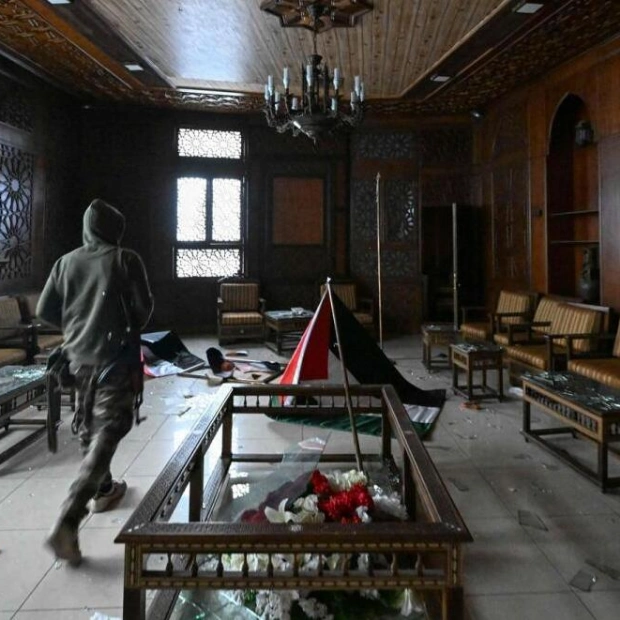A man stands amidst the ruins as parts of the Barzah scientific research center north of Damascus continue to burn on December 10, 2024, following an Israeli airstrike the previous day. — AFP
Israel intensified its strikes on Syrian army bases on Tuesday, claiming the attacks are aimed at preventing weapons from falling into the hands of hostile forces. However, it denied reports that its forces had advanced into Syrian territory beyond the buffer zone along the border. In Damascus, banks reopened for the first time since the ousting of President Bashar Al Assad, marking a significant step towards restoring normalcy. Shops began to reopen, traffic resumed on the roads, construction workers returned to repair a roundabout in the city center, and street cleaners swept the streets.
Following Assad's departure on Sunday, which ended over five decades of his family's rule, Israeli troops entered a demilitarized zone inside Syria established after the 1973 war. Israel described the move as a temporary measure to ensure border security. Three security sources reported on Tuesday that Israeli forces had advanced beyond the demilitarized zone. One Syrian source claimed they had reached the town of Qatana, several kilometers east of the buffer zone and close to Damascus airport. However, an Israeli military spokesperson refuted these claims, stating that troops remained within the demilitarized zone.
Israel asserts it is not seeking conflict with Syria's new authorities, but its jets have conducted bombing raids across the country over the past three days to prevent Syrian military equipment from being seized by hostile forces. Regional security sources and former Syrian army officers described Tuesday's air strikes as the most intense yet, targeting military installations and airbases, destroying dozens of helicopters, jets, and Republican Guard assets in and around Damascus. The estimated 200 raids overnight left the Syrian army's assets in ruins, according to these sources.
Egypt, Qatar, and Saudi Arabia have condemned the Israeli incursion, with Saudi Arabia warning that it could jeopardize Syria's prospects for security restoration. Israel informed the UN Security Council that its airstrikes would continue for several days but emphasized that it was not intervening in Syria's internal conflict. It described its actions as "limited and temporary measures" taken solely to protect its security. Amid the celebratory atmosphere in Damascus, Assad's prime minister, Mohammed Jalali, agreed on Monday to transfer power to the rebel-led Salvation Government, an administration previously operating in a rebel-held area in northwest Syria.
The main rebel commander, Ahmed Al Sharaa, also known as Abu Mohammed Al Golani, met with Jalali and Vice-President Faisal Mekdad on Monday to discuss the formation of a transitional government. Jalali indicated that the handover could take several days. The reopening of banks on Tuesday was a crucial step towards restoring normal life, as Syrians had been left without cash following the regime's collapse over the weekend.
Four mini-buses arrived at the Central Bank of Syria, carrying employees who returned to work for the first time since Assad's fall. "It’s a new shift, it’s a new day, a new year, a new life," said Sumayra Al Mukli. The rapid advance of the militia alliance led by Hayat Tahrir Al Sham (HTS), a former Al Qaeda affiliate, marked a significant turning point for the Middle East. The civil war that began in 2011 resulted in hundreds of thousands of deaths, one of the largest refugee crises in modern history, and left cities in ruins, countryside depopulated, and the economy devastated by global sanctions.
"This is an incredible moment for the Syrian people," said Deputy US Ambassador to the UN Robert Wood in New York. "We're focused on seeing how the situation evolves. Can there be a governing authority in Syria that respects the rights and dignity of its population?"
Source link: https://www.khaleejtimes.com






